| Listing 1 - 7 of 7 |
Sort by
|

ISBN: 0262082365 9780262082365 Year: 2001 Publisher: Cambridge (Mass.): MIT Press,
Abstract | Keywords | Export | Availability | Bookmark
 Loading...
Loading...Choose an application
- Reference Manager
- EndNote
- RefWorks (Direct export to RefWorks)
Computer networks --- Computernetwerken --- Computers--Netwerken --- Ordinateurs--Réseaux --- Réseaux d'ordinateurs --- Réseaux informatiques --- Education --- Réseaux d'ordinateurs --- Data processing --- Informatique --- #SBIB:309H501 --- #SBIB:316.334.1O440 --- Computer uses in education --- Computers in education --- Educational computing --- Microcomputer uses in education --- Microcomputers in education --- Communication systems, Computer --- Computer communication systems --- Data networks, Computer --- ECNs (Electronic communication networks) --- Electronic communication networks --- Networks, Computer --- Teleprocessing networks --- Data transmission systems --- Digital communications --- Electronic systems --- Information networks --- Telecommunication --- Cyberinfrastructure --- Electronic data processing --- Network computers --- Mediapedagogiek (incl. mediadidactiek) --- Onderwijsgedrag: algemeen --- Distributed processing --- Education - Data processing

ISBN: 1280200200 9786610200207 0306475332 0792371887 Year: 2001 Publisher: Dordrecht ; Boston : Kluwer Academic Publishers,
Abstract | Keywords | Export | Availability | Bookmark
 Loading...
Loading...Choose an application
- Reference Manager
- EndNote
- RefWorks (Direct export to RefWorks)
Education --- Internet in education --- Data processing --- Computer science. --- Multimedia systems. --- Education. --- Professional & Vocational Education. --- User Interfaces and Human Computer Interaction. --- Multimedia Information Systems. --- Educational Technology. --- Computers and Education. --- Professional education. --- Vocational education. --- User interfaces (Computer systems). --- Multimedia information systems. --- Educational technology. --- Education—Data processing. --- Instructional technology --- Technology in education --- Technology --- Educational innovations --- Instructional systems --- Teaching --- Computer-based multimedia information systems --- Multimedia computing --- Multimedia information systems --- Multimedia knowledge systems --- Information storage and retrieval systems --- Interfaces, User (Computer systems) --- Human-machine systems --- Human-computer interaction --- Education, Vocational --- Vocational training --- Work experience --- Technical education --- Education, Professional --- Career education --- Education, Higher --- Aids and devices
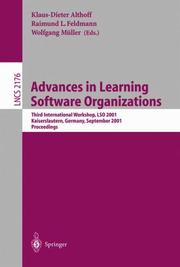
ISBN: 3540425748 3540448144 Year: 2001 Publisher: New York, NY ; Berlin : Springer-Verlag,
Abstract | Keywords | Export | Availability | Bookmark
 Loading...
Loading...Choose an application
- Reference Manager
- EndNote
- RefWorks (Direct export to RefWorks)
The importance of production and use of high quality software is still growing, as more and more businesses depend on information technology. Well educated, highly skilled, and experienced employees characterize the situation in most companies in the developed countries. Increasingly they work together in temporary networks with geographically distributed offices. Using and developing their knowledge is a key issue in gaining competitive advantages. We have learned during recent years that the exchange and development of knowledge (which we call learning) demands a great deal of human interaction. However, it is widely recognized that information systems will, in many cases, enable the sharing of experience across distributed organizations and act as a knowledge repository. A Learning Software Organization (LSO) will turn Intellectual Capital into market shares and profit, as it establishes the means to manage its knowledge. The LSO workshop series was created in 1999 to provide a communication forum that addresses the questions of organizational learning from a software point of view and builds upon existing work on Knowledge Management and Organizational Learning. It aims at bringing together practitioners and researchers for an open exchange of experience with successes and failures in organizational learning. Right from the beginning, fostering interdisciplinary approaches and providing an opportunity to learn about new ideas has been a central issue of the workshop series. The feedback that we have obtained in recent years has encouraged us to continue our work for a better understanding of the setup and running of Learning Software Organizations.
Software engineering --- Expert systems (Computer science) --- Computer Science --- Engineering & Applied Sciences --- Computer science. --- Software engineering. --- Artificial intelligence. --- Education --- Management information systems. --- Computer engineering. --- Computer Science. --- Software Engineering/Programming and Operating Systems. --- Computer Engineering. --- Software Engineering. --- Management of Computing and Information Systems. --- Computers and Education. --- Artificial Intelligence (incl. Robotics). --- Data processing. --- Information Systems. --- Education. --- Artificial Intelligence. --- AI (Artificial intelligence) --- Artificial thinking --- Electronic brains --- Intellectronics --- Intelligence, Artificial --- Intelligent machines --- Machine intelligence --- Thinking, Artificial --- Bionics --- Cognitive science --- Digital computer simulation --- Electronic data processing --- Logic machines --- Machine theory --- Self-organizing systems --- Simulation methods --- Fifth generation computers --- Neural computers --- Children --- Education, Primitive --- Education of children --- Human resource development --- Instruction --- Pedagogy --- Schooling --- Students --- Youth --- Civilization --- Learning and scholarship --- Mental discipline --- Schools --- Teaching --- Training --- Computer software engineering --- Engineering --- Education—Data processing. --- Informatics --- Science --- Computer-based information systems --- EIS (Information systems) --- Executive information systems --- MIS (Information systems) --- Sociotechnical systems --- Information resources management --- Management --- Computers --- Communication systems --- Design and construction
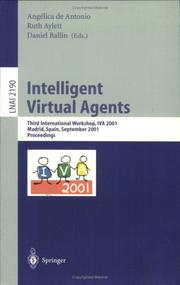
ISBN: 3540448128 3540425705 Year: 2001 Publisher: Berlin, Heidelberg : Springer Berlin Heidelberg : Imprint: Springer,
Abstract | Keywords | Export | Availability | Bookmark
 Loading...
Loading...Choose an application
- Reference Manager
- EndNote
- RefWorks (Direct export to RefWorks)
Predicting the future is a risky game, and can often leave egg on one’s face. However when the organizers of the Intelligent Virtual Environments workshop at the European Conference on AI predicted that the field of Intelligent Virtual Agents would grow and mature rapidly, they were not wrong. From this small workshop spawned the successful one on Intelligent Virtual Agents, held in Manchester in 1999. This volume comprises the proceedings of the much larger third workshop held in Madrid, September 10 11, 2001, which successfully achieved the aim of taking a more international focus, bringing together researchers from all over the world. We received 35 submissions from 18 different countries in America, Asia, and Africa. The 16 papers presented at the conference and published here show the high quality of the work that is currently being done in this field. In addition, five contributions were selected as short papers, which were presented as posters at the workshop. This proceedings volume also includes the two prestigious papers presented at the workshop by our keynote speakers: Daniel Thalmann, Professor at the Swiss Federal Institute of Technology (EPFL) in Lausanne and Director of the Computer Graphics Lab., who talked about The Foundations to Build a Virtual Human Society. Jeff Rickel, Project Leader at the Information Sciences Institute and a Research Assistant Professor in the Department of Computer Science at the University of Southern California, who debated about Intelligent Virtual Agents for Education and Training: Opportunities and Challenges.
Computer simulation --- Interactive computer systems --- Virtual computer systems --- Computer Science --- Engineering & Applied Sciences --- Computer science. --- User interfaces (Computer systems). --- Artificial intelligence. --- Education --- Computer Science. --- User Interfaces and Human Computer Interaction. --- Artificial Intelligence (incl. Robotics). --- Information Systems Applications (incl. Internet). --- Computers and Education. --- Data processing. --- Computer uses in education --- Computers in education --- Educational computing --- Microcomputer uses in education --- Microcomputers in education --- AI (Artificial intelligence) --- Artificial thinking --- Electronic brains --- Intellectronics --- Intelligence, Artificial --- Intelligent machines --- Machine intelligence --- Thinking, Artificial --- Bionics --- Cognitive science --- Digital computer simulation --- Electronic data processing --- Logic machines --- Machine theory --- Self-organizing systems --- Simulation methods --- Fifth generation computers --- Neural computers --- Interfaces, User (Computer systems) --- Human-machine systems --- Human-computer interaction --- Informatics --- Science --- Education. --- Artificial Intelligence. --- Children --- Education, Primitive --- Education of children --- Human resource development --- Instruction --- Pedagogy --- Schooling --- Students --- Youth --- Civilization --- Learning and scholarship --- Mental discipline --- Schools --- Teaching --- Training --- Application software. --- Education—Data processing. --- Application computer programs --- Application computer software --- Applications software --- Apps (Computer software) --- Computer software --- User interfaces (Computer systems)
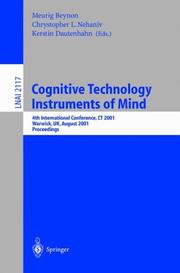
ISBN: 3540424067 3540446176 Year: 2001 Publisher: Berlin, Heidelberg : Springer Berlin Heidelberg : Imprint: Springer,
Abstract | Keywords | Export | Availability | Bookmark
 Loading...
Loading...Choose an application
- Reference Manager
- EndNote
- RefWorks (Direct export to RefWorks)
Cognitive Technology: Instruments of Mind Cognitive Technology is the study of the impact of technology on human cog- tion, the externalization of technology from the human mind, and the pragmatics of tools. It promotes the view that human beings should develop methods to p- dict, analyse, and optimize aspects of human-tool relationship in a manner that respects human wholeness. In particular the development of new tools such as virtual environments, new computer devices, and software tools has been too little concerned with the impacts these technologies will have on human cog- tive and social capacities. Our tools change what we are and how we relate to the world around us. They need to be developed in a manner that both extends human capabilities while ensuring an appropriate cognitive t between organism and instrument. The principal theme of the CT 2001 conference and volume is declared in its title: Instruments of Mind. Cognitive Technology is concerned with the interaction between two worlds: that of the mind and that of the machine. In science and engineering, this - teraction is often explored by posing the question: how can technology be best tailored to human cognition? But as the history of technological developments has consistently shown, cognition is also fashioned by technology. Technologies as diverse as writing, electricity generation, and the silicon chip all illustrate the profound and dynamic impact of technology upon ourselves and our conceptions of the world.
Cognition --- Cognitive science --- Human information processing --- Artificial intelligence --- Psychology --- Social Sciences --- Computer science. --- Database management. --- User interfaces (Computer systems). --- Artificial intelligence. --- Computer graphics. --- Education --- Computers and civilization. --- Computer Science. --- Database Management. --- Artificial Intelligence (incl. Robotics). --- User Interfaces and Human Computer Interaction. --- Computers and Society. --- Computers and Education. --- Computer Graphics. --- Data processing. --- Education. --- Artificial Intelligence. --- Informatics --- Science --- Automatic drafting --- Graphic data processing --- Graphics, Computer --- Computer art --- Graphic arts --- Electronic data processing --- Engineering graphics --- Image processing --- Children --- Education, Primitive --- Education of children --- Human resource development --- Instruction --- Pedagogy --- Schooling --- Students --- Youth --- Civilization --- Learning and scholarship --- Mental discipline --- Schools --- Teaching --- Training --- AI (Artificial intelligence) --- Artificial thinking --- Electronic brains --- Intellectronics --- Intelligence, Artificial --- Intelligent machines --- Machine intelligence --- Thinking, Artificial --- Bionics --- Digital computer simulation --- Logic machines --- Machine theory --- Self-organizing systems --- Simulation methods --- Fifth generation computers --- Neural computers --- Data base management --- Data services (Database management) --- Database management services --- DBMS (Computer science) --- Generalized data management systems --- Services, Database management --- Systems, Database management --- Systems, Generalized database management --- Digital techniques --- Education—Data processing. --- Civilization and computers --- Interfaces, User (Computer systems) --- Human-machine systems --- Human-computer interaction --- User interfaces (Computer systems)
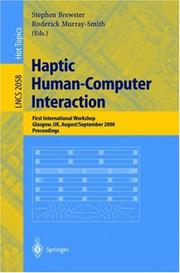
ISBN: 3540423567 3540445897 Year: 2001 Publisher: Berlin, Heidelberg : Springer Berlin Heidelberg : Imprint: Springer,
Abstract | Keywords | Export | Availability | Bookmark
 Loading...
Loading...Choose an application
- Reference Manager
- EndNote
- RefWorks (Direct export to RefWorks)
Haptic human-computer interaction is interaction between a human computer user and the computer user interface based on the powerful human sense of touch. Haptic hardware has been discussed and exploited for some time, particularly in the context of computer games. However, so far, little attention has been paid to the general principles of haptic HCI and the systematic use of haptic devices for improving efficiency, effectiveness, and satisfaction in HCI. This book is the first one to focus on haptic human-computer interaction. It is based on a workshop held in Glasgow, UK, in August / September 2000. The 22 revised full papers presented were carefully reviewed and selected from 35 submissions. Besides a brief historic survey, the book offers topical sections on haptic interfaces for blind people, collaborative haptics, psychological issues and measurement, and applications of haptics.
Human-computer interaction --- Virtual reality --- Touch --- Computer Science --- Engineering & Applied Sciences --- Feeling --- Haptic sense --- Haptics --- Tactile perception --- Tactual perception --- Computer science. --- User interfaces (Computer systems). --- Artificial intelligence. --- Image processing. --- Education --- Computers and civilization. --- Computer Science. --- User Interfaces and Human Computer Interaction. --- Artificial Intelligence (incl. Robotics). --- Image Processing and Computer Vision. --- Computers and Society. --- Computers and Education. --- Data processing. --- Somesthesia --- Computer vision. --- Education. --- Artificial Intelligence. --- Children --- Education, Primitive --- Education of children --- Human resource development --- Instruction --- Pedagogy --- Schooling --- Students --- Youth --- Civilization --- Learning and scholarship --- Mental discipline --- Schools --- Teaching --- Training --- Machine vision --- Vision, Computer --- Artificial intelligence --- Image processing --- Pattern recognition systems --- AI (Artificial intelligence) --- Artificial thinking --- Electronic brains --- Intellectronics --- Intelligence, Artificial --- Intelligent machines --- Machine intelligence --- Thinking, Artificial --- Bionics --- Cognitive science --- Digital computer simulation --- Electronic data processing --- Logic machines --- Machine theory --- Self-organizing systems --- Simulation methods --- Fifth generation computers --- Neural computers --- Informatics --- Science --- Optical data processing. --- Education—Data processing. --- Civilization and computers --- Optical computing --- Visual data processing --- Integrated optics --- Photonics --- Computers --- Interfaces, User (Computer systems) --- Human-machine systems --- Optical equipment --- User interfaces (Computer systems)
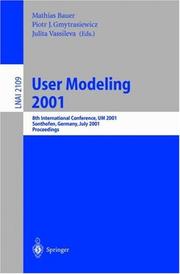
ISBN: 3540423257 3540445668 Year: 2001 Publisher: Berlin, Heidelberg : Springer Berlin Heidelberg : Imprint: Springer,
Abstract | Keywords | Export | Availability | Bookmark
 Loading...
Loading...Choose an application
- Reference Manager
- EndNote
- RefWorks (Direct export to RefWorks)
681.3*H52 --- 681.3*I2 <063> --- 681.3*H5 --- 681.3*K6 --- 681.3*I6 <063> --- 681.3*J4 <063> --- 681.3*J5 --- Information interfaces and presentation: user interfaces, input devices, input strategies, user interface management systems --- Artificial intelligence. AI--Congressen --- Computerwetenschap--?*H5 --- Management of computing and information systems: economics --- Simulation and modeling (Computing methodologies)--See also {681.3*G3}--Congressen --- Social and behavioral sciences (Computer applications)--Congressen --- Geesteswetenschappen (computertoepassingen) --- Human-computer interaction --- User interfaces (Computer systems) --- Computer Science --- Engineering & Applied Sciences --- 681.3*J4 <063> Social and behavioral sciences (Computer applications)--Congressen --- 681.3*I6 <063> Simulation and modeling (Computing methodologies)--See also {681.3*G3}--Congressen --- 681.3*K6 Management of computing and information systems: economics --- 681.3*I2 <063> Artificial intelligence. AI--Congressen --- 681.3*H52 Information interfaces and presentation: user interfaces, input devices, input strategies, user interface management systems --- Computer science. --- Computer communication systems. --- Operating systems (Computers). --- User interfaces (Computer systems). --- Artificial intelligence. --- Education --- Computer Science. --- Operating Systems. --- User Interfaces and Human Computer Interaction. --- Computer Communication Networks. --- Information Systems Applications (incl. Internet). --- Artificial Intelligence (incl. Robotics). --- Computers and Education. --- Data processing. --- Computer uses in education --- Computers in education --- Educational computing --- Microcomputer uses in education --- Microcomputers in education --- AI (Artificial intelligence) --- Artificial thinking --- Electronic brains --- Intellectronics --- Intelligence, Artificial --- Intelligent machines --- Machine intelligence --- Thinking, Artificial --- Bionics --- Cognitive science --- Digital computer simulation --- Electronic data processing --- Logic machines --- Machine theory --- Self-organizing systems --- Simulation methods --- Fifth generation computers --- Neural computers --- Interfaces, User (Computer systems) --- Human-machine systems --- Computer operating systems --- Computers --- Disk operating systems --- Systems software --- Communication systems, Computer --- Computer communication systems --- Data networks, Computer --- ECNs (Electronic communication networks) --- Electronic communication networks --- Networks, Computer --- Teleprocessing networks --- Data transmission systems --- Digital communications --- Electronic systems --- Information networks --- Telecommunication --- Cyberinfrastructure --- Network computers --- Informatics --- Science --- Operating systems --- Distributed processing --- Education. --- Artificial Intelligence. --- Children --- Education, Primitive --- Education of children --- Human resource development --- Instruction --- Pedagogy --- Schooling --- Students --- Youth --- Civilization --- Learning and scholarship --- Mental discipline --- Schools --- Teaching --- Training --- Application software. --- Education—Data processing. --- Application computer programs --- Application computer software --- Applications software --- Apps (Computer software) --- Computer software --- Operating systems (Computers) --- Computer networks.
| Listing 1 - 7 of 7 |
Sort by
|

 Search
Search Feedback
Feedback About UniCat
About UniCat  Help
Help News
News